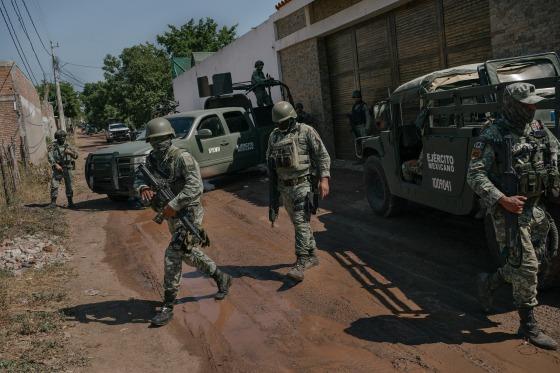As the U.S. government considers designating major drug cartels as terrorist organizations, economic experts and industry leaders warn that such a move could have unintended and far-reaching consequences for the American economy. While aiming to curb the influence of these criminal networks, labeling cartels as terrorists may complicate international trade, disrupt supply chains, and deter investment, raising critical questions about the balance between national security and economic stability. This article examines the potential economic fallout of the proposed policy and the broader implications for U.S. domestic and foreign economic interests.
Economic Fallout from Designating Cartels as Terrorist Organizations
The decision to classify drug cartels as terrorist entities could exacerbate an already precarious economic landscape in the United States. While the move aims to intensify law enforcement efforts,it risks disrupting critical supply chains and international trade relations. Industries dependent on cross-border commerce, such as agriculture, manufacturing, and retail, may face increased operational costs due to tighter regulatory scrutiny and border controls. This, in turn, could lead to inflationary pressures on consumer goods and hinder economic growth amid an ongoing recovery period.
Key economic concerns include:
- Heightened shipping delays and customs inspections, impacting delivery times and inventory management.
- Potential retaliation from affected countries, resulting in compromised trade agreements and tariffs.
- Reduced foreign investment driven by perceived political instability and unpredictable regulatory environments.
- Increased government spending on counterterrorism actions, diverting resources from social and infrastructure programs.
| Sector | Projected Impact | Economic Risk Level |
|---|---|---|
| Agriculture | Supply chain delays, export restrictions | High |
| Manufacturing | Increased costs, disrupted logistics | Moderate |
| Retail | Inflated prices, inventory shortages | High |
| Foreign Investment | Decreased inflow, market volatility | Moderate |
Unintended Consequences for Cross-Border Trade and Investment
Redefining cartels as terrorists could trigger a wave of unintended fallout that jeopardizes the fluidity of cross-border trade and foreign direct investment (FDI). Heightened risks of asset seizures and criminal penalties may discourage legitimate businesses from engaging with international partners originating from or associated with perceived cartel-influenced regions. This pressure risks fracturing supply chains reliant on timely and cost-efficient transfers and could ultimately stifle economic growth in both the U.S.and its trading partners.
Moreover, the aggressive stance might prompt retaliatory measures and complicate international cooperation on trade agreements and enforcement mechanisms.Key concerns include:
- Decreased investor confidence: Heightened legal uncertainty transmutes into market volatility and reduced capital flows.
- Strain on diplomatic relations: Partner countries viewing this classification as overreach could impose countermeasures or reduce regulatory collaboration.
- Increased compliance costs: Companies may face heavier burdens to verify and certify supply chains, inflating operational expenses.
| Impact Area | Potential Effect | Economic Outcome |
|---|---|---|
| Cross-Border Trade | Restricted flows of goods and services | Supply chain disruptions, price volatility |
| Foreign Investment | Risk-averse behavior by investors | Slowed capital influx, reduced innovation |
| Regulatory Collaboration | Weakened enforcement partnerships | Ineffective cross-border crime control |
Challenges in International Cooperation and Law Enforcement
The move to categorize drug cartels as terrorist organizations introduces critically important complications for international cooperation. Many allied nations, bound by their own legal frameworks and diplomatic interests, may resist adopting this label due to the potential diplomatic fallout and differing definitions of terrorism.This discord can stall joint efforts in combatting transnational crime, creating jurisdictional ambiguities that cartels can exploit to evade law enforcement. Moreover, intelligence sharing – a cornerstone of cross-border operations – risks being hindered by increased bureaucracy and political contention.
Enforcement agencies also face operational hurdles when engaging with cartel networks under the terrorist designation. Resources may be diverted to counterterrorism protocols, which differ markedly from conventional drug enforcement techniques, potentially slowing down critical investigations. Below is a simplified comparison of how enforcement priorities shift under each designation:
| Criteria | Drug Cartel Label | Terrorist Label |
|---|---|---|
| Main Focus | Drug Trafficking Control | National Security Threat |
| Law Enforcement Approach | Criminal Investigation | Counterterrorism Operations |
| International Collaboration | Shared Drug Enforcement Policies | Complex Political Negotiations |
| Intelligence Sharing | Operational Efficiency | Heightened Secrecy |
Policy Recommendations to Balance Security and Economic Stability
To effectively navigate the trade-offs between national security and economic vitality, policymakers must adopt a nuanced approach that avoids blunt categorizations leading to unintended consequences. Strengthening cross-agency collaboration, particularly between the Department of Commerce and law enforcement, can enhance targeted actions against cartel activities without triggering broad supply chain disruptions. Key measures include:
- Implementing calibrated sanctions that focus on specific entities rather than broad labeling.
- Incentivizing private sector partnerships to improve intelligence sharing and risk assessment.
- Promoting transparency in trade practices to minimize economic collateral damage.
Furthermore, economic resilience can be bolstered by investing in alternatives to vulnerable supply chains and supporting community-based development programs that address the root causes of cartel influence. The table below outlines a proposed framework balancing security and economic considerations:
| Policy Focus | Security Impact | Economic Outcome |
|---|---|---|
| Targeted Financial Sanctions | Disrupts cartel funding sources | Minimizes broader market disruption |
| Supply Chain Diversification | Reduces choke points for illicit trade | Enhances market stability |
| Community Economic Development | Weakens cartel recruitment | Supports sustainable growth |
Insights and Conclusions
while the intent to curb cartel violence is clear, branding these organizations as terrorists carries significant economic risks for the United States. Experts warn that such a designation could disrupt vital trade relationships, increase regulatory burdens, and escalate violence, ultimately harming both the economy and public safety. As policymakers weigh their options, a balanced approach that addresses security threats without jeopardizing economic stability will be essential. The debate over labeling cartels as terrorists underscores the complex intersection of national security and economic policy in an era of evolving transnational crime.




